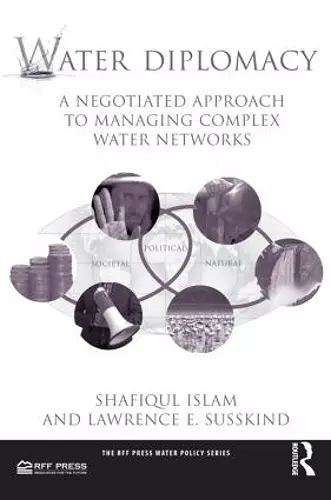Water Diplomacy
A Negotiated Approach to Managing Complex Water Networks
Shafiqul Islam author Lawrence E Susskind author
Format:Paperback
Publisher:Taylor & Francis Inc
Published:20th Jun '12
Currently unavailable, and unfortunately no date known when it will be back
This paperback is available in another edition too:
- Hardback£135.00(9781617261022)

Water is the resource that will determine the wealth, welfare, and stability of many countries in the twenty-first century. This book offers a new approach to managing water that will overcome the conflicts that emerge when the interactions among natural, societal, and political forces are overlooked. At the heart of these conflicts are complex water networks. In managing them, science alone is insufficient and so is policy-making that doesn't take science into account. Solutions will only emerge if a negotiated or diplomatic approach that blends science, policy, and politics is used to manage water networks.
The authors show how open and constantly changing water networks can be managed successfully using collaborative adaptive techniques to build informed agreements among disciplinary experts, water users with conflicting interests, and governmental bodies with countervailing claims.
Shafiqul Islam is an engineer with over twenty-five years of practical experience in addressing water issues. Lawrence Susskind is founder of MIT's Environmental Policy and Planning Program and a leader of the Program on Negotiation at Harvard Law School. Together they have developed a text that is relevant for students and experienced professionals working in a variety of engineering, science, and applied social science fields. They show how new thinking about water conflict can replace the zero-sum battles that pit experts, politicians, and stakeholders against each other in counter-productive ways. Their volume not only presents the key elements of a theory of water diplomacy; it includes excerpts and commentary from more than two dozen seminal readings as well as practice exercises that challenge readers to apply what they have learned.
"Water Diplomacy is a great addition to the existing literature on water negotiations and conflict management." -W. Todd Jarvis, Oregon State University, in Ground Water (2012).
"This book offers a water diplomacy framework that challenges conventional wisdom in water resources research and practice. It focuses on networks rather than systems and value creation rather than zero-sum thinking. The selected readings, commentaries, and simulations provide essential grounding that is invaluable to water resources students, researchers and professionals." –Helen Ingram, University of Arizona and Founding Warmington Endowed Chair, University of California at Irvine.
"Water management, both in terms of quantity and quality, leaves much to be desired in nearly all countries of the world. Thus, all over the world we see tensions developing between various stakeholders of different water uses. An important question is how these tensions can be diffused peacefully and in a timely manner? In this must read book, Islam and Susskind address this complex question and discuss the processes and alternatives that can be successfully used in a logical and easily understandable manner" – Asit K. Biswas, founder and president, Third World Centre for Water Management, Atizapan, Mexico, and Distinguished Visiting Professor, Lee Kuan Yew School for Public Policy, Singapore.
"This is an unusual book in several respects. Notwithstanding a lot of lip-service to the need for interdisciplinary research and integrated policies in the water sector, such endeavours are rarely undertaken in full seriousness by disciplinarily trained end disposed academics. The two authors, and their network and programme, are certainly an exception to that observation. Here is brought together solid science from the natural/hydrological and the social/political sciences to address one of the major challenges of our time: the management and governance of complex water resources problems and conflicts. It is one of the very first efforts to rethink existing reductionist approaches to water across the boundaries of the natural and social sciences by putting the notion of 'complexity' centre-stage, particularly the ontological complexity of water resource processes (their non-linearity and unpredictability), and the societal complexity of the contested management and governance of water resources, requiring an adaptive and (non zero sum) negotiation-based approach in networks.
The epistemological complexity of water knowledge comes to the fore much less - in that sense the book is firmly located in the tradition of problem solving oriented water studies. Illustrative of this is also that in the main text of the book explicit theorisation of 'social power' or 'social relations of power' is hardly found, notwithstanding the centrality of 'politics' in the overall approach. The book is also unusual in the sense that it provides an excellent teaching tool, by including and commenting on key readings for the 'water diplomacy framework' that is developed and advocated, and by the narratives and the Indopotamia role play simulation that are part of the book.
All in all this book is a very original effort to push the thinking and policy making on water resources management in the direction of a more realistic and contextualised 'strategic action' perspective, away from standardisation and rational planning, and it is certain to spark a lot of, most welcome, discussion and debate." –Peter P. Mollinga, Professor of Development Studies, School of Oriental and African Studies (SOAS), London.
The book addresses a topic that will surely need further attention, in terms of management and governance. The use of the term ‘diplomacy’ brings the network aspect into focus at all spatial levels. Islam and Susskind have established their approach with an ‘all winning proposition’, offering stakeholders a strategic view, rather than a restrictive standardized engineering based planning perspective. – Progress in Development Studies, Jayanta Bandyopadhyay (Retd) with help from Shouvik Das and Tuhin Bhadra, Centre for Development and Environment Policy, Indian Institute of Management, India
ISBN: 9781617261039
Dimensions: unknown
Weight: 670g
360 pages